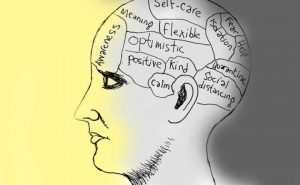 To take care of yourself and your loved ones during the pandemic, it’s important to follow credible new sources, be flexible and kind, identify opportunities for gratitude, exercise caution, and find meaning in everyday experiences. Consider how societal changes have helped you make positive changes in your life. Do you have a better awareness of your own health and wellbeing? With a disease as highly contagious as Covid-19, better self-care and awareness is not only critical to your own health, it could save hundreds or thousands of lives.
To take care of yourself and your loved ones during the pandemic, it’s important to follow credible new sources, be flexible and kind, identify opportunities for gratitude, exercise caution, and find meaning in everyday experiences. Consider how societal changes have helped you make positive changes in your life. Do you have a better awareness of your own health and wellbeing? With a disease as highly contagious as Covid-19, better self-care and awareness is not only critical to your own health, it could save hundreds or thousands of lives.
Knowing this, how do we adapt psychologically to the effects of quarantine, isolation and social distancing? First and foremost, only follow official guidelines. Given the amount of misinformation easily shared on the internet and by mass media, people can easily become confused or overwhelmed. It’s best to limit the amount of news or social media you digest daily and only follow national credible sources like the Centers for Disease Control (CDC) and the American Psychological Association (APA). As important as it is to keep yourself informed, it is equally important to take breaks from the 24-hour news cycle.
We know we can influence the progression of the disease by promoting proven health and well- being strategies, including mindfulness, relaxation, and physical exercise. Luckily, at present, Mainers can still walk and exercise outside regularly. This offers enormous returns to overall health. Parents and other mentors must be role models to the younger ones in every household. Be creative! Practice a variety of self-care strategies including looking for opportunities to move away from the screen and enjoy the outside, get in touch with your inner artist, read a new favorite book (or rediscover an old classic).
Respect social distancing and stay-at-home orders, but don’t forget that we are social. Check in with friends and family through social media, video-chat, and phone calls. It is especially important to stay in touch with older or at-risk loved ones as they are likely feeling the most isolated.
Fear can lead to impulsive risky behaviors or discrimination. We have all heard the stories of young people on spring break in Florida just a week ago, still congregating on the beaches. Or of the discrimination against people of Asian descent. When people feel they have no control over their surroundings, they often behave anxiously and even selfishly. Now, more than ever, we must exercise caution for our collective humanity, and not place blame on others because of race, ethnicity, or cultural identifications.
Don’t hesitate to reach out for support. Feeling anxious, isolated, panicked, or overwhelmed during the pandemic is to be expected. Many, if not most, psychologists in Maine are available for TeleHealth sessions and can help find strategies to navigate these uncertain times. Look for supports that enable you to respond to the pandemic through objective, calm, and optimistic strategies.
Finally, a nod to our frontline responders and healthcare workers. Many, rightly so, fear they will contract the virus or transmit it to family members. There is overwhelming pressure on them to succeed in the face of public scrutiny. Organizations like The American Red Cross of Maine and Maine Disaster Behavioral Health are working to provide Psychological First Aid to our first responders. Please reach out!
As we all know, mental health is essential health. Take care of yourselves and your loved ones today for a more resilient tomorrow.
Thomas Cooper, PsyD
President, Maine Psychological Association
